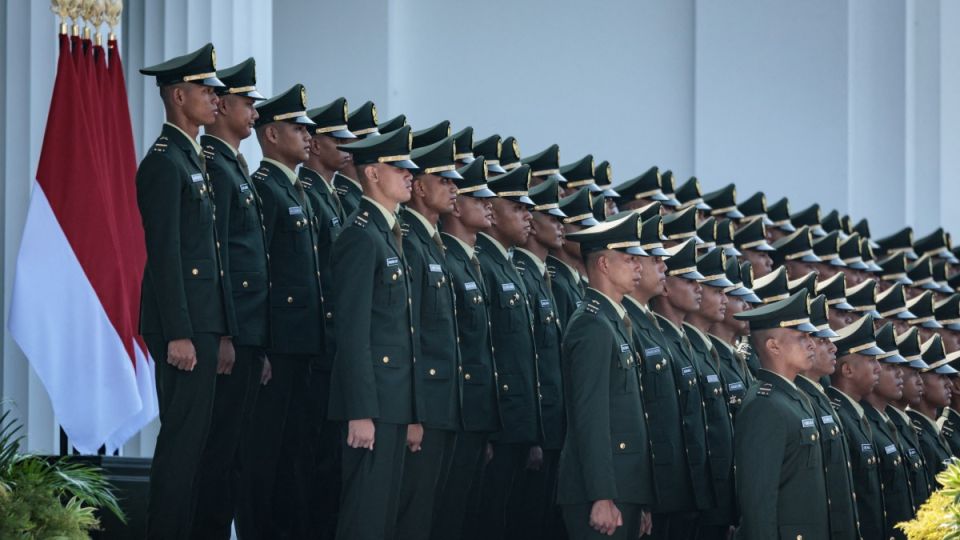November 27, 2025
JAKARTA – The government plans to form 150 new battalions each year starting in 2026 to guard vital state assets, such as oil refineries, as part of an ambitious expansion of the Indonesian Military (TNI), a move that once again raises concerns about deeper military encroachment into civilian affairs.
Defense Minister Sjafrie Sjamsoeddin announced the plan after a meeting with TNI chief Gen. Agus Subiyanto and lawmakers from the House of Representatives’ Commission I overseeing defense on Monday.
“National defense is essential to safeguarding Indonesia’s sovereignty and maintaining stability to support the government’s economic development programs. For that reason, we need to strengthen our forces, including by adding new battalions to the Army,” Sjafrie said.
He said the TNI has already formed 150 territorial development battalions this year and would continue creating the same number annually until the total matches Indonesia’s 514 regencies and cities.
The battalions are tasked not only with bolstering national defense but also with supporting farming, fisheries and livestock programs to boost livelihoods of people across the country.
“This is not an attempt at territorial dominance but a measure to maintain territorial integrity, safeguard national interests and protect strategic industries tied to national sovereignty, such as Pertamina’s oil refineries,” Sjafrie said, adding that soldiers will begin deployments to the state-owned oil and gas giant’s refineries next month.
Beyond securing state assets, Sjafrie said President Prabowo Subianto has also instructed the TNI to safeguard three regions dubbed as “centers of gravity” that are considered critical to national stability and economic activity. They are Jakarta, the westernmost province of Aceh and Papua, the country’s most resource-rich yet underdeveloped and conflict-prone region.
In Papua, Sjafrie said, the TNI would deploy additional troops under what he described as a “smart approach” combining soft and hard tactics aimed at “winning the hearts” of Papuan communities.
“At the same time, we will not allow our sovereignty to be trampled on, so we must remain vigilant against tactical threats that could endanger communities and disrupt development in Papua,” he added.
In just over a year in office, Prabowo, who is a former special forces commander, has presided over the largest peacetime military expansion in decades. Alongside the new territorial development battalions, he has inaugurated six new regional Army commands (Kodam) as well as new naval, air and special forces units.
Blurring the line
Military expert Al Araf of rights group Imparsial said the plan to add 150 new battalions each year was not only “excessive” but risks eroding TNI professionalism in the long term.
“[The expansion] will only strain the defense budget. The military’s purpose is to prepare for external threats, not manage food security or land cultivation, and this shift will undermine its core war-fighting capability,” Araf said on Tuesday.
He added that deploying troops to strategic industries and key regions pushed the TNI too deeply into civilian affairs and reflected what he described as the Prabowo administration’s “militaristic governance”, which views military intervention as the solution to every problem.
Activist Dimas Bagus Arya of the Commission for Missing Persons and Victims of Violence (Kontras) also questioned the urgency behind the expansion, arguing that it reflected misplaced budget priorities and risks further entrenching military involvement in civilian sectors.
“The government should reconsider, especially given Indonesia’s long historical trauma with militarism,” Dimas said on Tuesday. “When the TNI is increasingly drawn into civilian affairs, it risks violating the Constitution and pulling the military away from professionalism. In the long run, it also undermines civilian institutions and disrupts civilian meritocracy.”
Clear ground rules
Meanwhile, Institute for Security and Strategic Studies (ISESS) cofounder Khairul Fahmi said the recent amendment to the TNI Law, which expanded the number of government posts available to active military personnel and broadened the military’s noncombat operations, has effectively provided the legal basis for the TNI’s expanded roles.
Even so, he urged the government to clearly define the scope and limits of any noncombat deployment. In the case of securing oil refineries, for instance, Pertamina must remain the primary decision-maker, with the police acting as the lead law enforcement body, while the TNI should only be mobilized to address high-level threats.
“What is crucial is ensuring that the rules of engagement are clear, mutually agreed upon and include firm boundaries, so there is no overlap with the police or the private sector,” Khairul said on Tuesday.
Pertamina vice president for corporate communication Muhammad Baron was quoted by Antara as saying on Tuesday that the company welcomed the deployment of soldiers to its oil refineries “as part of a joint effort to strengthen Pertamina’s internal security system”.


